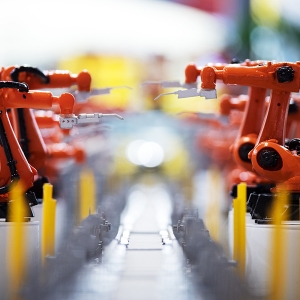Automation and Industry 4.0
 14.12.2018 -
On the Scope online platform, Hans Thalbauer comments on the topic of automation, gives his views on industry 4.0 and shares how he sees the ERP legacy today and in the future. After 18 years working for SAP, Hans Thalbauer is very familiar with these topics. Today, as Senior Vice President, he is responsible for everything to do with the Internet of Things and the digital supply chain.
14.12.2018 -
On the Scope online platform, Hans Thalbauer comments on the topic of automation, gives his views on industry 4.0 and shares how he sees the ERP legacy today and in the future. After 18 years working for SAP, Hans Thalbauer is very familiar with these topics. Today, as Senior Vice President, he is responsible for everything to do with the Internet of Things and the digital supply chain.What's special: He recognizes current movements and trends from the perspective of a manufacturer and user at the same time.
SAP has been automating all kinds of processes for many years and is therefore a pioneer in the field of industry 4.0. Many German companies that are tackling digitization do so with the help and support of SAP. Hans Thalbauer knows only too well that there are many hurdles to overcome.
The will to revolution vs. reality
Hans Thalbauer stresses in the article on Scope that companies are only interested in a Smart Factory or Manufacturing 4.0 if they see tangible added value for their production and development. In Germany, medium-sized and large companies are generally more open to innovation. Deloitte, for example, recently found this out in a study. 77% of the companies surveyed had integrated IoT projects into their manufacturing processes. Efficient production and high quality are cited as the primary goals and are pursued with modern means. Thalbauer emphasizes that new software is usually tested on a small scale in a test project. That's clever, because many questions and problems already come to light during the test phase. One problem is often the old and difficult to access ERP. Converting huge amounts of data, which already exist somewhere, to a completely new system is a stomachache for many decision makers. In addition to the administrative effort, there are high costs for the conversion. Fortunately, ERP systems also move with the times. Many providers of ERP solutions are already working with the option of connecting to a cloud and have significantly improved their speed.
Faster and better
The processing speed must be very high today, because Manufacturing 4.0 and the Internet of Things can only function at an appropriate speed. In order to control processes in the supply chain, the system must be real-time capable - and of course fast. A good and modern ERP provider must therefore be able to process all the data in the main memory. This is the only way to create genuine Manufacturing Execution Systems (MES). This is called in-memory processing. In Hans Thalbauer's eyes, the second important aspect is the connection of all departments to the cloud. Container technology, which increases flexibility and portability, is used at the technical level for this purpose. Containers are a component of the cloud strategy and this will probably no longer be possible to circumvent in the future. A good ERP provider can therefore also be recognized by the fact that it also offers cloud platforms - without these, nothing will soon be possible. This also includes microservices and other technologies such as blockchain and big data analyses.
Quality control and maintenance with the digital twin
Quality control and the maintenance of the new systems remain a matter of course. Only the technology changes. A little rethinking is required here. Hans Thalbauer refers to the concept of the digital twin, which is the basis of automation and also of IoT processes. This digital twin is an identical copy of a product in the system. Data and parameters of the design and business management aspects are stored here. Networking with the real twin is done via sensors. The digital twins form a complete network that can be used to obtain important answers to questions about production, maintenance, development and marketing. The digital twin can have an AI, can learn and analyze - but it doesn't have to. This enables real-time analyses and simulations that advance production and open up many new possibilities.
New insights and new ideas
Industry 4.0, automation and the new IT architecture open up many new possibilities. In general, thanks to the new technology, companies have a much better overview of all processes running in the company and thus a better idea of what is already sufficiently optimized and what can be improved. Quality control takes place on a completely different level and a concept of predictive maintenance can be established. This is also appreciated by insurance companies, who can assume that errors will be detected early, that malfunctions will occur less frequently and that damage claims will therefore occur much less frequently. This is just one example of how modern technology can save costs in many different areas. However, the digital twin not only provides maintenance data, but also other data that provides ideas for streamlining and improvement - and continuously so. Hans Thalbauer points out that numerous companies are already using the advantages of the new ERP and MES and the associated new opportunities for improvement and customer acquisition.
« Back to overview
